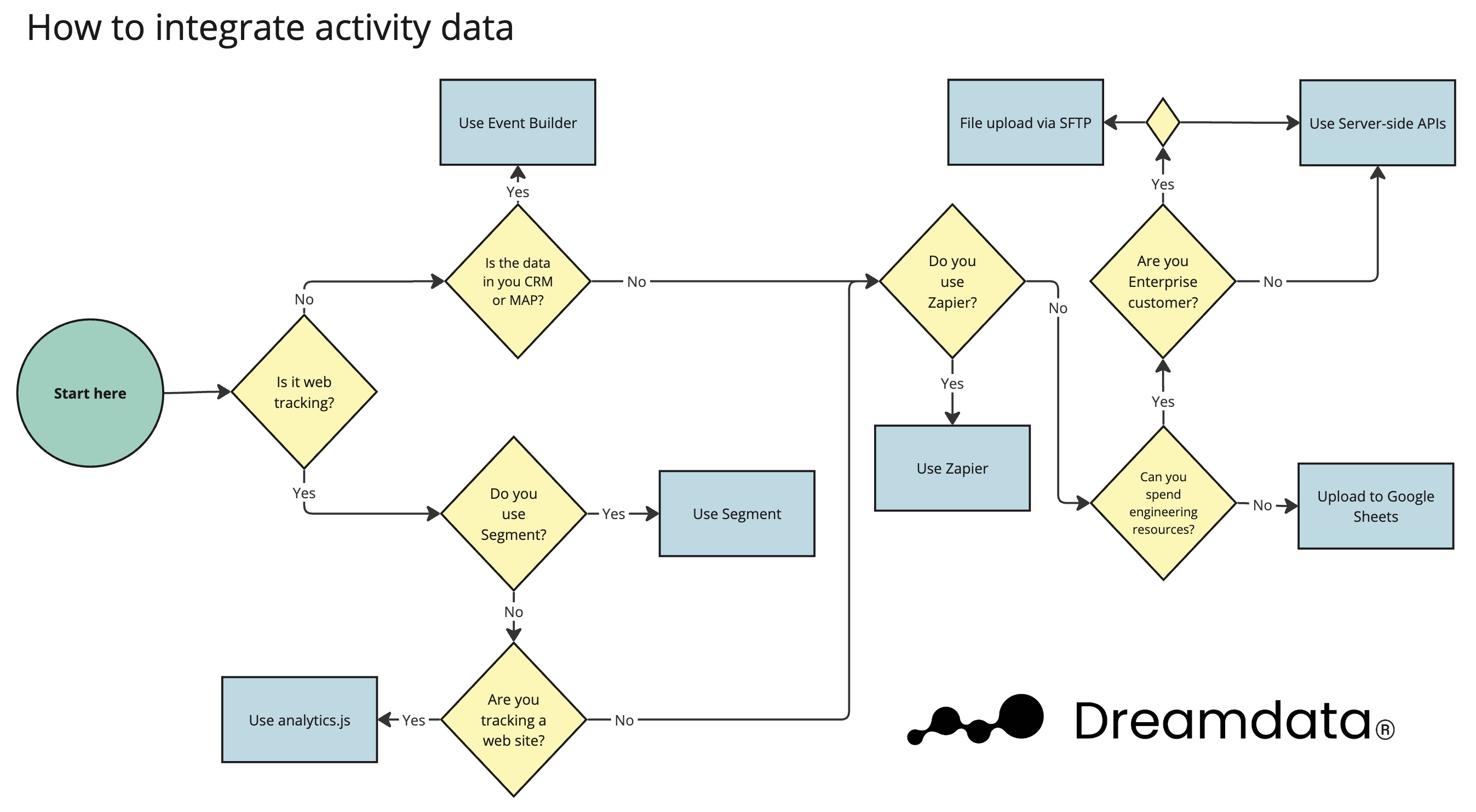Data Hub
How do you best integrate activity data with Dreamdata?

Get started with Dreamdata
Intro to Dreamdata
Setting Up Dreamdata
Understanding: Single sign-on and SAML
How to invite your colleagues to Dreamdata
How to validate your data
How to set up stage models
How to Begin? Choosing Your Onboarding Path
Dashboards
Home
Engagement
Performance
Content Performance
Setup Content Reporting
Content Performance - Dashboard Options
What KPI should you use to measure the effect of B2B content?
Measuring influenced pipeline for B2B content - the true conversion metric
What content generates pipeline?
Which channel performs best for different content?
Paid
Overview
Return on Ads Spend (ROAS)
Google Search Ads
Google Display Ads
LinkedIn Ads
Microsoft Ads
Facebook Ads
YouTube Ads
Capterra Ads
G2
Organic
Acquisition
ROI
Performance vs. Revenue attribution: A guide on when to use what
AI-Generated Report Summary
Journeys
Reveal
Company Journey report
Deals
Dreamdata Report for LinkedIn Engagement
Search for companies or contacts
Funnel Stages Report
Link to the Customer Journey from your CRM
Revenue Analytics
Content Analytics
Revenue Reporting
Revenue Segmentation
Revenue Attribution
Attribution Models- dashboard explanation
Customer Acquisition Cost (CAC) report
Time to Value Report
Evaluate how G2 Influences your Business
B2B Benchmarks
Activation Hub
Signals
Syncs
Matched Audiences
Conversions
LinkedIn Conversions (CAPI)
Microsoft Enhanced Conversions
Meta Conversions
Optimizing Google Ads with Dreamdata: Which Stages to Feed Enhanced Conversions?
Google Ads Enhanced Conversion For Leads
Google Ads Enhanced Conversion: Salesforce vs Dreamdata
Google Ads Enhanced Conversion: HubSpot vs Dreamdata
CRM Syncs
Syncs - Automation
Syncs - Data Privacy
Understanding Data Privacy for B2B Advertising: Consent for Conversions and Audiences
Webhook syncs
Notifications
Audience Builder
Audiences: HubSpot vs Dreamdata
Data Platform
Sources
Paid
Setting up Meta Ads
Paid sources: Overview
Setting up NextRoll
Setting up X (Twitter) Ads
Setting up Microsoft Ads
Setting up LinkedIn Ads
Setting up Google Ads
Setting up LinkedIn Ads access & permissions
Setting up G2
Setting up Google Search
Setting up Capterra
CRM
Setting up Microsoft Dynamics
Setting up Salesforce
Parent and Child Account Relationships
Setting up Pipedrive
Setting up HubSpot
Marketing Automation
Setting up Salesforce Marketing Cloud Account Engagement (Pardot)
Setting up Salesforce Marketing Cloud - Early Access
Setting up Marketo
Setting up Oracle Eloqua - Early Access
Google Sheet
Import Customer Acquisition Cost data using Google Sheet
Import Events data using Google Sheet
Import ROI Cost Data using Google Sheet
Custom Upload
Upload custom Stage Objects
Upload custom ROI Cost or CAC data
Upload custom Events and Web Tracking
Upload Custom CRM data
Custom Data Upload
Zapier
Setting up Outreach
Setting up Intercom
Data Hub
Attribution Models
Overview of Attribution Models
Data-Driven Attribution
Custom Attribution Models
Attribution Exclusions
LinkedIn Impression Attribution
Creating Attribution Models
Stage Models
Setup Guide: All Salesforce Opportunities entering specific Stage
Setup Guide: All Microsoft Dynamics Opportunities in a specific Stage
Setup Guide: All Pipedrive Deals entering specific Stage
Stage Model Preview
Setup Guide: Creation of Opportunities/Deals
Setup Guide: Tracked sign-up events
How Dreamdata Handles Currency Exchange in Stage Models
Setup Guide: All HubSpot Deals entering specific Stage
Stage Model documentation
Data Hub
Understanding: How to map UTMs in Dreamdata
Understanding: UTM mapping rules
Event Builder: Create additional events in Dreamdata
Importing Historical Web Tracking Data into Dreamdata with the Event Builder
Event Builder: Best Practices
Data Modelling Schedule
Data access
Data Warehouse
Google BigQuery V2
Snowflake Schema V3
AWS S3 V2
Data Warehouse Schema
Connect your Dreamdata data to Snowflake
Setting up Data Export to BigQuery of CRM Properties
Build your own Revenue Attribution report in BigQuery
Streamline Your Revenue Analysis: Visualize all your revenue data in one place by using BigQuery Export
Google Bigquery Export - Why can't I see or query the data?
Free Datasets
Snowflake
Google BigQuery Legacy
AWS S3 Legacy
Microsoft Azure Storage
Reverse ETL
Automatically create Accounts not in your CRM
How to share Signals with your Sales team
What is Reverse ETL?
Business Intelligence
Guides for Looker Studio Reporting
Getting Started with Looker Studio Templates
Google Connected Sheets
Connect Dreamdata to Tableau
Overview
Company Data Enrichment
Working with multiple currencies
Dreamdata without connecting a CRM
Importing Historical Web Tracking Data into Dreamdata
General Settings
Menu: Settings
Allowed Domains
Learn more about the 'Ad Account' filter
Learn more about the 'Branded Search' filter
Setting up B2B Benchmarks
CRM-Based Channel and Source in the Absence of Tracking Activity
CRM filters
FAQ
Glossary
Understanding: Unspecified
Understanding: Conversions
Understanding: Unknown
Understanding: Monthly Tracked User (MTU)
Understanding: Source, channel and event
Understanding: Session
Understanding: Referrer
Company Logo
Understanding changes in historic reporting of attribution
How Dreamdata Maps Contacts to Companies
Why does my Linkedin campaign performance show 0 Opps?
Understanding the difference: Funnel Stages vs Time to Value reports
What is a company?
Understanding: Anonymous
Forgotten password
Which IP addresses do I need to whitelist?
Data retention and deletion
How is anonymous traffic linked to companies?
Why am I seeing gaps in Segmentation report data?
Can I connect multiple CRM's?
Can I update my company details?
Can I exclude content or websites from being tracked?
Understanding: Influenced vs Attributed Leads and Value
Understanding the Difference: Conversions vs. Stages
What does Visitors, Contacts and Companies mean?
How do we connect stage models
Roles and Permissions
Understanding: First party vs. third party cookies
Benchmarks FAQs
What is the reporting Time Zone?
Why are my dashboards empty?
Why am I seeing more sessions than page views?
Agency Partners
Welcome Partner!
Ideal Customer Profile
Our Partner Tiers
Partner Advantages
Referral Guide and UTM tracking
Our Partner Material
Agency Partners - Contact Us
Tracking
All Categories > Data Platform > Data Hub > Data Hub

